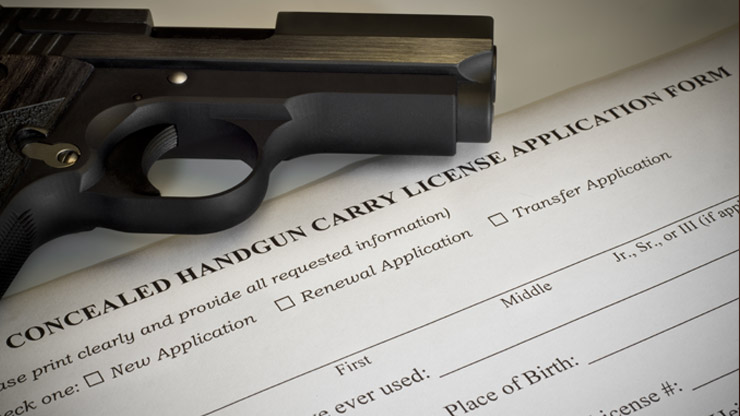
Although the right to bear arms is protected by the 2nd Amendment to United States Constitution; for residents of Illinois, in order to legally possess or own firearms and/or ammunition, individuals must have a valid Firearm Owners Identification (FOID) card.
The idea of a FOID Card was created in Illinois by the Firearm Owner’s Identification Act (430 ILCS 65). This law was passed in 1968 as part of a push for public safety and to identify people who should be ineligible to possess and acquire firearms. The FOID Act can be found at the Illinois General Assembly website, at www.ilga.gov/legislation/ilcs/ilcs.asp.
Individuals applying for a FOID card must be Illinois residents, not otherwise prohibited from owning a firearm in accordance with state or federal law, and must be 21 years of age, unless they have a parent or guardian sponsor that is eligible for a FOID card. Obtaining a FOID card itself is quite easy; and requires only a recent photo, a small processing fee, and a valid driver’s license or state identification card. However, and perhaps more importantly, maintaining one’s eligibility to own a firearm may prove to be more difficult. Unfortunately, it is not uncommon for a person to have their gun rights taken away.
Both federal and state laws regulate gun ownership. The federal law specifies 9 characteristics that disqualify a person from owning firearms. The Illinois law lists an additional 7 factors. Some of the most common issues that prohibit a person from obtaining or maintaining a valid FOID are:
If any of the above factors apply to you, there may be a way to restore your rights and have your FOID card reinstate. Your first step should be to speak with an experienced attorney who is familiar with the process of petitioning to restore firearm rights in Illinois. Below are a few common questions and answers on this subject.
I have lost my gun rights, what are the chances that I can get them back?
No Lawyer, including the author of this article, can ever guarantee a result. However, the majority of firms, including ours, offer free consultation that will allow you to discuss your case and provide guidance about the process and the likelihood of success for regaining your firearm rights.
How do I get my rights back?
Generally speaking, under Illinois law, if you are:
1) Prohibited from possessing a firearm,
2) Denied a FOID card
3) The agency fails to respond to your application within 30 days OR
4) Your existing card is revoked or seized
You may be eligible to file an appeal for the restoration of your rights directly with the Department of State Police. However, if your rights were denied or revoked specifically because of a conviction for a “forcible felony”, stalking, aggravated stalking, domestic battery, any violation of the Illinois Controlled Substances Act, the Methamphetamine Control and Community Protection Act, the Cannabis Control Act that is classified as a Class 2 or greater felony, any felony violation involving deadly weapons under Article 24 of the Criminal Code of 1961, or any adjudication as a minor for what would be a felony if committed as an adult. You must file an appeal in the circuit court for the county you reside in.
What do I have to prove?
In order to restore your gun rights, an individual must follow several procedural requirements and prove several factors to the satisfaction of either the director of the State Police or to the circuit court judge. These include:
As you can see, the first factor may be easily met, however, the last two factors may be more difficult depending on the presiding judge and what proof they are looking for to satisfy these elements. An experienced attorney is often required to make the legal arguments necessary to satisfy the last 2 factors. This is often because under Federal law, prior convictions for certain crimes act as an automatic prohibition of a person’s gun rights.
How long does the process take?
The appeal process takes an average of six to eight months. However, depending on the facts of the case, the process can take much longer depending on whether an applicant is required to appeal directly to the State Police or the Circuit Clerk. In our experience, if you are required to first appeal through the State Police, this can add up to a year to the process and is variable based on how long it takes the State Police to respond to the application.
Do I have to go to court?
You will be required to attend court if you petition through the Circuit Clerk. If you hire an attorney to represent you, it is possible that your attendance at court may be waived and your attorney can act on your behalf. During the representation, your attorney may ask you provide testimony or evidence to support your appeal.
What happens if we win?
You should receive an order from either the circuit court or the Department of Public Safety indicating that your rights to own a firearm have been restored. Note, it may take a few weeks for all the appropriate agencies to update their records.
What if we lose and my rights are denied?
If your appeal is denied, your attorney will evaluate the reason for the denial and provide you with your options as well is give our recommendations as to how you should proceed. Even if you are denied, it may be possible to cure the pleadings or submit additional evidence to the court to be considered with your application.
Many people believe it is impossible to get your gun rights back after being convicted of a felony. The process may seem complicated, but there is hope with most cases. If you are interested in reinstating your FOID card, your first step should be to speak with a knowledgeable attorney in your area.